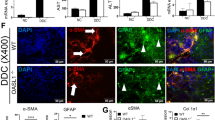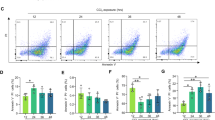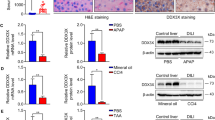Abstract
Acute liver injury (ALI) is associated with high mortality rates. Despite its severity, there are currently no effective interventions, underscoring the urgent need for research on the mechanisms driving ALI progression. Irisin, a hormone derived from its precursor FNDC5, has been shown to play a critical role in some chronic liver diseases. In this study we investigated the role of hepatic FNDC5/Irisin in a mouse model of AILI induced by acetaminophen (APAP, 400 mg/kg, i.p.). The mice were euthanized at 6, 12 and 24 h after APAP injection, then the blood and liver tissues were collected for analyses. By conducting transcriptome sequencing, we identified that both the expression and release of FNDC5/Irisin were significantly increased and highly correlated with AILI. We showed that knockout of Irisin significantly improved APAP-induced tissue damage and hepatocyte death in mouse liver. Conversely, preinjection of recombinant Irisin protein (1 mg·kg–1·d–1, i.p., for 3 days) exacerbated the AILI in FNDC5 knockout mice. RNA-seq analysis revealed that knockout of FNDC5/Irisin reduced inflammatory responses and JNK/NF-κB activation in APAP-treated mouse liver, while exogenous Irisin administration aggravated JNK/NF-κB-mediated inflammation. In primary mouse hepatocytes treated with APAP (15 mM), application of Irisin (100 ng/mL) activated the integrin αV/JNK/NF-κB axis, driving inflammation and oxidative stress. In summary, this study highlights Irisin as a critical regulator in AILI progression. Circulating Irisin could be a novel biomarker for AILI diagnosis, and targeting FNDC5/Irisin could hold promise for the development of novel treatments for AILI.

This is a preview of subscription content, access via your institution
Access options
Subscribe to this journal
Receive 12 print issues and online access
$259.00 per year
only $21.58 per issue
Buy this article
- Purchase on SpringerLink
- Instant access to full article PDF
Prices may be subject to local taxes which are calculated during checkout







Similar content being viewed by others
References
Br VK, Sarin SK. Acute-on-chronic liver failure: terminology, mechanisms and management. Clin Mol Hepatol. 2023;29:670–89.
Rovegno M, Vera M, Ruiz A, Benitez C. Current concepts in acute liver failure. Ann Hepatol. 2019;18:543–52.
Kumar R, Anand U, Priyadarshi RN. Liver transplantation in acute liver failure: dilemmas and challenges. World J Transpl. 2021;11:187–202.
Fontana RJ, Liou I, Reuben A, Suzuki A, Fiel MI, Lee W, et al. AASLD practice guidance on drug, herbal, and dietary supplement-induced liver injury. Hepatology. 2023;77:1036–65.
Stravitz RT, Fontana RJ, Karvellas C, Durkalski V, McGuire B, Rule JA, et al. Future directions in acute liver failure. Hepatology. 2023;78:1266–89.
Flint RB, Mian P, van der Nagel B, Slijkhuis N, Koch BC. Quantification of acetaminophen and its metabolites in plasma using UPLC-MS: doors open to therapeutic drug monitoring in special patient populations. Ther Drug Monit. 2017;39:164–71.
Chidiac AS, Buckley NA, Noghrehchi F, Cairns R. Paracetamol (acetaminophen) overdose and hepatotoxicity: mechanism, treatment, prevention measures, and estimates of burden of disease. Expert Opin Drug Metab Toxicol. 2023;19:297–317.
Cai X, Cai H, Wang J, Yang Q, Guan J, Deng J, et al. Molecular pathogenesis of acetaminophen-induced liver injury and its treatment options. J Zhejiang Univ Sci B. 2022;23:265–85.
Tian J, Zhang S, Li L, Lin X, Li Y, Zhao K, et al. Febuxostat ameliorates APAP-induced acute liver injury by activating Keap1/Nrf2 and inhibiting TLR4/NF-kappaB p65 pathways. Exp Biol Med (Maywood). 2023;248:1864–76.
Chou AH, Lee HC, Liao CC, Yu HP, Liu FC. ERK/NF-kB/COX-2 signaling pathway plays a key role in curcumin protection against acetaminophen-induced liver injury. Life (Basel) 2023;13:2150.
Shi C, Hao B, Yang Y, Muhammad I, Zhang Y, Chang Y, et al. JNK signaling pathway mediates acetaminophen-induced hepatotoxicity accompanied by changes of glutathione S-transferase A1 content and expression. Front Pharmacol. 2019;10:1092.
Tao J, Xue C, Wang X, Chen H, Liu Q, Jiang C, et al. GAS1 promotes ferroptosis of liver cells in acetaminophen-induced acute liver failure. Int J Med Sci. 2023;20:1616–30.
Yu Y, Chang L, Hu Q, Zhu J, Zhang J, Xia Q, et al. P2rx1 deficiency alleviates acetaminophen-induced acute liver failure by regulating the STING signaling pathway. Cell Biol Toxicol. 2023;39:2761–74.
Bostrom P, Wu J, Jedrychowski MP, Korde A, Ye L, Lo JC, et al. A PGC1-alpha-dependent myokine that drives brown-fat-like development of white fat and thermogenesis. Nature. 2012;481:463–8.
Ho MY, Wang CY. Role of irisin in myocardial infarction, heart failure, and cardiac hypertrophy. Cells. 2021;10:2103.
Li DJ, Sun SJ, Fu JT, Ouyang SX, Zhao QJ, Su L, et al. NAD+-boosting therapy alleviates nonalcoholic fatty liver disease via stimulating a novel exerkine Fndc5/irisin. Theranostics. 2021;11:4381–402.
Pang Q, Wang P, Pan Y, Dong X, Zhou T, Song X, et al. Irisin protects against vascular calcification by activating autophagy and inhibiting NLRP3-mediated vascular smooth muscle cell pyroptosis in chronic kidney disease. Cell Death Dis. 2022;13:283.
Zhu W, Sahar NE, Javaid HMA, Pak ES, Liang G, Wang Y, et al. Exercise-induced irisin decreases inflammation and improves NAFLD by competitive binding with MD2. Cells. 2021;10:3306.
Bi J, Zhang J, Ren Y, Du Z, Li Q, Wang Y, et al. Irisin alleviates liver ischemia-reperfusion injury by inhibiting excessive mitochondrial fission, promoting mitochondrial biogenesis and decreasing oxidative stress. Redox Biol. 2019;20:296–306.
Gaggini M, Cabiati M, Del Turco S, Navarra T, De Simone P, Filipponi F, et al. Increased FNDC5/Irisin expression in human hepatocellular carcinoma. Peptides. 2017;88:62–6.
Liao X, Luo Y, Gu F, Song W, Nie X, Yang Q. Therapeutic role of FNDC5/irisin in attenuating liver fibrosis via inhibiting release of hepatic stellate cell-derived exosomes. Hepatol Int. 2023;17:1659–71.
Kim H, Wrann CD, Jedrychowski M, Vidoni S, Kitase Y, Nagano K, et al. Irisin mediates effects on bone and fat via alphaV integrin receptors. Cell. 2018;175:1756–68 e17.
Kam TI, Park H, Chou SC, Van Vranken JG, Mittenbuhler MJ, Kim H, et al. Amelioration of pathologic alpha-synuclein-induced Parkinson’s disease by irisin. Proc Natl Acad Sci USA. 2022;119:e2204835119.
Ramachandran A, Jaeschke H. Acetaminophen hepatotoxicity. Semin Liver Dis. 2019;39:221–34.
Wang M, Sun J, Yu T, Wang M, Jin L, Liang S, et al. Diacerein protects liver against APAP-induced injury via targeting JNK and inhibiting JNK-mediated oxidative stress and apoptosis. Biomed Pharmacother. 2022;149:112917.
Zhang X, Zhao Y, Li M, Wang M, Qian J, Wang Z, et al. A synergistic regulation works in matrix stiffness-driven invadopodia formation in HCC. Cancer Lett. 2024;582:216597.
Wang J, Zhao YT, Zhang LX, Dubielecka PM, Qin G, Chin YE, et al. Irisin deficiency exacerbates diet-induced insulin resistance and cardiac dysfunction in type II diabetes in mice. Am J Physiol Cell Physiol. 2023;325:C1085–C96.
Guo M, Yao J, Li J, Zhang J, Wang D, Zuo H, et al. Irisin ameliorates age-associated sarcopenia and metabolic dysfunction. J Cachexia Sarcopenia Muscle. 2023;14:391–405.
Yang BC, Leung PS. Irisin is a positive regulator for ferroptosis in pancreatic cancer. Mol Ther Oncolytics. 2020;18:457–66.
Li RL, Wu SS, Wu Y, Wang XX, Chen HY, Xin JJ, et al. Irisin alleviates pressure overload-induced cardiac hypertrophy by inducing protective autophagy via mTOR-independent activation of the AMPK-ULK1 pathway. J Mol Cell Cardiol. 2018;121:242–55.
Zhong L, Zhao J, Huang L, Liu Y, Pang X, Zhan K, et al. Runx2 activates hepatic stellate cells to promote liver fibrosis via transcriptionally regulating Itgav expression. Clin Transl Med. 2023;13:e1316.
Turaga RC, Satyanarayana G, Sharma M, Yang JJ, Wang S, Liu C, et al. Targeting integrin alphavbeta3 by a rationally designed protein for chronic liver disease treatment. Commun Biol. 2021;4:1087.
Greenhalgh SN, Matchett KP, Taylor RS, Huang K, Li JT, Saeteurn K, et al. Loss of integrin alphavbeta8 in murine hepatocytes accelerates liver regeneration. Am J Pathol. 2019;189:258–71.
Islam MR, Valaris S, Young MF, Haley EB, Luo R, Bond SF, et al. Exercise hormone irisin is a critical regulator of cognitive function. Nat Metab. 2021;3:1058–70.
Grgic J. What is the effect of paracetamol (acetaminophen) ingestion on exercise performance? current findings and future research directions. Sports Med. 2022;52:431–9.
Yu Q, Kou W, Xu X, Zhou S, Luan P, Xu X, et al. FNDC5/Irisin inhibits pathological cardiac hypertrophy. Clin Sci (Lond). 2019;133:611–27.
Acknowledgements
This study was supported by the China Postdoctoral Science Foundation (2024M752443 to WWZ), Postdoctoral Fellowship Program of CPSF (GZC20231957 to WWZ). We thank Scientific Research Center of Wenzhou Medical University for consultation and instrument availability that supported this work.
Author information
Authors and Affiliations
Contributions
GL, WWZ, and WL designed the research and provided comprehensive supervision. QHZ, LMJ, and WWZ wrote the paper. QHZ, LMJ, MSL, MXW, and YQX performed research and were involved in data curation. QHZ, LMJ, YQC and JXY analyzed data. QHZ and LMJ contributed to the visualization.
Corresponding authors
Ethics declarations
Competing interests
The authors declare no competing interests.
Additional information
Publisher’s note Springer Nature remains neutral with regard to jurisdictional claims in published maps and institutional affiliations.
Supplementary information
Rights and permissions
Springer Nature or its licensor (e.g. a society or other partner) holds exclusive rights to this article under a publishing agreement with the author(s) or other rightsholder(s); author self-archiving of the accepted manuscript version of this article is solely governed by the terms of such publishing agreement and applicable law.
About this article
Cite this article
Zhang, Qh., Jin, Lm., Lin, Ms. et al. FNDC5/Irisin exacerbates APAP-induced acute liver injury through activating JNK/NF-κB and inflammatory response. Acta Pharmacol Sin 46, 1946–1957 (2025). https://doi.org/10.1038/s41401-025-01509-7
Received:
Accepted:
Published:
Issue date:
DOI: https://doi.org/10.1038/s41401-025-01509-7



